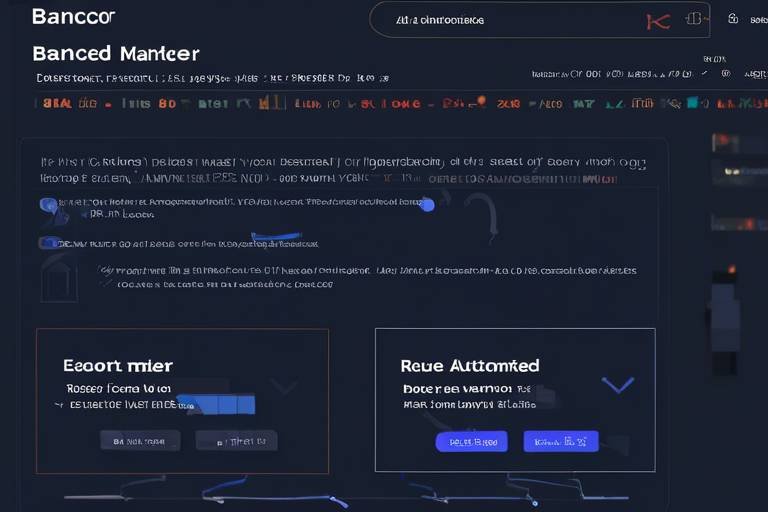Civic - Identity Verification on the Blockchain
In a world where our identities are increasingly at risk, Civic emerges as a beacon of hope, revolutionizing the way we think about identity verification. Imagine a digital landscape where your personal information is not just stored but is protected by the unbreakable fortress of blockchain technology. That's precisely what Civic offers—a secure, decentralized, and user-controlled identity verification system. This article delves into how Civic leverages the power of blockchain to enhance privacy and security while significantly reducing the potential for fraud. We will explore the nuances of Civic's approach, the implications for everyday users and businesses alike, and how this innovative solution is paving the way for a more secure digital future.
Identity verification is crucial in today's digital landscape. With the rise of online transactions, social media, and remote work, the need to ensure that individuals are who they claim to be has never been more critical. Think about it: every time you log into a bank account or make an online purchase, you are trusting that the entity on the other side is legitimate. Without robust identity verification, the risk of fraud skyrockets, leading to financial losses and compromised personal information. In essence, effective identity verification is the backbone of trust in the digital world, preventing impersonation and safeguarding sensitive data.
Blockchain technology offers a decentralized and tamper-proof method for storing identity data. Unlike traditional databases that can be vulnerable to hacking, blockchain records are immutable and transparent. Each transaction is securely encrypted and linked to the previous one, creating a chain of trust that is incredibly difficult to breach. This decentralized nature means that there is no single point of failure, enhancing security and instilling confidence in the identity verification process. For users, this translates to a heightened sense of security and peace of mind, knowing that their identity is protected by cutting-edge technology.
Civic employs a unique method of identity verification that leverages blockchain's capabilities to create a system that is not only secure but also user-centric. Traditional identity verification often relies on centralized databases, which can be prone to breaches and misuse. In contrast, Civic allows users to control their own identity data, meaning they can share only what is necessary for verification without exposing their entire identity. This innovative approach not only enhances security but also reduces the risk of identity theft and fraud.
Decentralization is at the heart of Civic's identity verification process. By allowing users to have control over their own identity data, Civic empowers individuals to manage their personal information actively. Users can choose when and how to share their data, which is a significant departure from traditional methods that often leave individuals vulnerable to data breaches. This level of control fosters trust and encourages users to engage with digital services more confidently, knowing that their information is safeguarded.
Civic incorporates advanced privacy features to protect user information. For instance, users can authenticate their identity without revealing sensitive details, such as their full name or social security number. This is achieved through zero-knowledge proofs, a cryptographic method that allows one party to prove to another that a statement is true without revealing any additional information. Such features not only enhance privacy but also ensure that users maintain confidentiality during the verification process, making Civic a leader in privacy-centric identity verification.
Civic's identity verification technology has various real-world applications that can benefit both businesses and individuals. From financial institutions needing to comply with Know Your Customer (KYC) regulations to online platforms requiring user verification, Civic offers a streamlined and secure solution. Businesses can reduce the risk of fraud while enhancing customer trust, and individuals can enjoy safer online interactions. Whether it's accessing services in a digital marketplace or logging into a secure government portal, Civic's technology is paving the way for a more trustworthy digital ecosystem.
Despite its advantages, identity verification faces several challenges. One of the most significant hurdles is the need for widespread adoption of new technologies. Many businesses are still reliant on outdated methods, which can hinder the transition to more secure solutions like Civic. Additionally, the regulatory landscape is continually evolving, posing challenges for compliance. Civic addresses these challenges head-on, ensuring that its solutions are adaptable and in line with current regulations.
Navigating regulatory frameworks is essential for identity verification solutions. Civic ensures compliance with various regulations, such as GDPR and CCPA, while maintaining user privacy. By prioritizing compliance, Civic not only protects user data but also builds trust with businesses and users alike. This commitment to regulatory adherence positions Civic as a reliable partner in the identity verification landscape.
Technological limitations can hinder the adoption of identity verification solutions. Issues such as lack of interoperability between different systems can create friction in the user experience. Civic is actively working to address these barriers, ensuring that its technology can seamlessly integrate with existing platforms. By focusing on user experience and technological adaptability, Civic is poised to overcome these challenges and lead the way in identity verification.
The future of identity verification is evolving rapidly. With the increasing demand for secure online interactions, Civic is well-positioned to lead the way in this space. As technology continues to advance, we can expect to see even more innovative solutions that prioritize user control and privacy. Civic's commitment to enhancing security and reducing fraud will play a crucial role in shaping the future of identity verification, making it a key player in the digital landscape.
- What is Civic? Civic is a blockchain-based identity verification platform that allows users to control their personal information while ensuring secure transactions.
- How does Civic enhance security? Civic uses blockchain technology to create a decentralized and tamper-proof system for storing identity data, significantly reducing the risk of fraud.
- Can I control my own data with Civic? Yes, Civic empowers users to manage their identity data, allowing them to share only what is necessary for verification.
- What are the real-world applications of Civic? Civic's technology can be applied in various sectors, including finance, healthcare, and online services, to enhance security and trust.

The Importance of Identity Verification
In today's digital landscape, where our lives are increasingly intertwined with technology, identity verification has become more crucial than ever. Imagine logging into your bank account online, making a purchase, or even signing a contract—all of these actions require a strong assurance that you are, indeed, who you say you are. It’s like having a security guard at the entrance of a club, ensuring that only those with valid IDs get in. Without proper verification, we open ourselves up to a plethora of risks, including fraud, identity theft, and unauthorized access to sensitive information.
Identity verification serves as a protective shield, safeguarding both individuals and businesses from potential threats. When we think about the implications of not verifying identities, it’s a bit like leaving your front door wide open; you wouldn’t do that, would you? Here are some key reasons why identity verification is essential:
- Fraud Prevention: By confirming identities, we can significantly reduce the risk of fraud. Whether it’s financial fraud or identity theft, having a reliable verification process in place can help thwart malicious activities.
- Building Trust: In a world filled with online interactions, trust is paramount. Businesses that implement robust identity verification processes can enhance their credibility, reassuring customers that their personal information is safe.
- Regulatory Compliance: Many industries are subject to strict regulations regarding data protection and privacy. Identity verification helps organizations comply with these regulations, avoiding potential legal issues.
Furthermore, as the digital economy continues to grow, the need for secure identity verification becomes even more pronounced. Consumers are increasingly aware of the importance of protecting their personal information, and they expect businesses to take the necessary steps to ensure their data is secure. In this context, identity verification is not just a technical requirement; it’s a fundamental aspect of customer experience.
In summary, the importance of identity verification cannot be overstated. It acts as a fundamental pillar for security in our digital interactions, ensuring that individuals and organizations can engage confidently in a landscape where the risks are ever-evolving. As we delve deeper into the world of identity verification, it becomes clear that adopting innovative solutions—like those provided by Civic—can enhance our ability to verify identities effectively and securely.

How Blockchain Enhances Security
In an era where digital interactions are the norm, ensuring the security of identity data is more critical than ever. Blockchain technology emerges as a beacon of hope, offering a decentralized and tamper-proof method to store sensitive information. Unlike traditional databases that can be vulnerable to hacks, blockchain's unique structure ensures that once data is entered, it cannot be altered or deleted without consensus from the network. This characteristic alone significantly enhances the trustworthiness of identity verification processes.
Imagine a world where your identity is protected by an unbreakable digital vault. Each piece of information, whether it's your name, address, or social security number, is stored in blocks that are linked together in a chain. This chain is visible to all participants in the network, but only those with the right permissions can access or modify the data. This transparency builds trust among users, as they can verify the integrity of the information without relying on a central authority. In essence, blockchain acts like a digital fingerprint, providing unique verification for each identity.
Moreover, the decentralized nature of blockchain means that there is no single point of failure. Traditional identity verification systems often rely on a central database, which can be a prime target for cyberattacks. However, with blockchain, the data is distributed across multiple nodes, making it virtually impossible for hackers to compromise the entire system. This added layer of security not only protects individual identities but also helps businesses mitigate risks associated with fraud.
To further illustrate how blockchain enhances security, consider the following key features:
- Immutability: Once data is recorded on the blockchain, it cannot be changed or deleted, ensuring the authenticity of identity information.
- Encryption: Data stored on the blockchain is encrypted, providing an additional layer of protection against unauthorized access.
- Consensus Mechanisms: Changes to the data require agreement from multiple parties, reducing the risk of fraudulent alterations.
These features work together to create a secure environment for identity verification, making it increasingly difficult for fraudsters to manipulate or steal personal information. As we move forward, the integration of blockchain technology into identity verification systems will undoubtedly reshape the landscape of online security.
- What is blockchain technology? Blockchain is a decentralized digital ledger that records transactions across many computers securely and transparently.
- How does blockchain enhance security in identity verification? By providing a tamper-proof and decentralized method of storing identity data, blockchain reduces the risk of fraud and unauthorized access.
- Can blockchain be hacked? While no system is entirely immune to hacking, the decentralized nature and consensus mechanisms of blockchain make it significantly more secure than traditional systems.
- What are the benefits of using Civic for identity verification? Civic offers enhanced privacy, user control over personal data, and a secure method of verifying identities, all powered by blockchain technology.

Civic's Unique Approach
Civic's approach to identity verification is not just a mere adaptation of traditional methods; it is a revolutionary shift that harnesses the power of blockchain technology. Imagine a world where you no longer have to hand over your personal information to every service provider you encounter. Instead, Civic allows you to maintain control over your identity, sharing only what is necessary, when it is necessary. This unique model is akin to having a digital vault where your identity information is securely stored and only accessed with your explicit permission.
At the heart of Civic's system is a decentralized architecture that eliminates the need for a central authority. This means that instead of relying on a single entity to verify your identity, Civic distributes the verification process across a network of nodes. Each node contributes to the verification process, ensuring that your data is not only secure but also tamper-proof. This decentralized approach significantly enhances trust, as it reduces the risks associated with data breaches that can occur in centralized systems.
One of the standout features of Civic's model is its use of cryptographic techniques to safeguard user information. When you go through the verification process with Civic, your identity data is encrypted, meaning that even if someone were to gain access to the blockchain, they would only see scrambled data. This level of security is crucial in today's world where data privacy is a growing concern.
Furthermore, Civic's system is designed to be user-friendly. Users can easily navigate the identity verification process through an intuitive interface, allowing them to verify their identity in just a few clicks. This simplicity is a game-changer, especially for those who may feel overwhelmed by technology. Civic combines cutting-edge technology with a user-centric design, making it accessible for everyone.
In addition, Civic's unique approach allows for real-time verification. This means that businesses can instantly verify the identity of their customers without the delays often associated with traditional verification methods. Imagine walking into a bar and being able to verify your age with a simple scan of your phone, eliminating the need for physical IDs. This not only enhances the customer experience but also reduces the chances of fraud, making it a win-win situation.
In summary, Civic's unique approach to identity verification is characterized by its decentralized architecture, cryptographic security, user-friendly design, and real-time capabilities. By empowering users to take control of their identity, Civic is not just changing the way we verify who we are, but is also paving the way for a more secure and private digital future.
- What makes Civic different from traditional identity verification systems?
Civic utilizes blockchain technology to decentralize identity verification, allowing users to maintain control over their personal data while enhancing security. - How does Civic ensure the privacy of user information?
Civic employs advanced cryptographic techniques to encrypt user data, ensuring that it remains confidential and secure from unauthorized access. - Can businesses easily integrate Civic into their existing systems?
Yes, Civic is designed to be user-friendly and easily integrated, allowing businesses to implement secure identity verification without significant changes to their operations. - What are the real-world applications of Civic's technology?
Civic's identity verification can be applied in various sectors, including finance, healthcare, and online services, enhancing security and trust in digital transactions.

Decentralization and User Control
In the realm of identity verification, decentralization plays a pivotal role in empowering users. Unlike traditional identity systems that rely on centralized databases controlled by a single entity, Civic's approach allows individuals to maintain ownership of their personal data. Imagine a world where you, and only you, decide who gets to see your information and when. This is the essence of user control in Civic's identity verification process.
With Civic, users can verify their identity without having to hand over sensitive information to multiple third parties. Instead, the identity data is securely stored on the blockchain, a decentralized ledger that is virtually tamper-proof. This means that once your information is recorded, it cannot be altered or deleted without your consent. The result? Enhanced security and privacy for users, who can engage in online transactions with confidence.
Furthermore, the decentralized nature of Civic’s system minimizes the risk of data breaches that often plague centralized systems. For example, when a centralized database is compromised, millions of users can be affected in one fell swoop. In contrast, with Civic, even if one user's data is targeted, the impact is limited to that individual, thereby preserving the integrity of the larger network.
Additionally, this user-centric approach fosters a sense of trust between users and businesses. When individuals know they have control over their data, they are more likely to share it with organizations that require identity verification. This can lead to smoother interactions and transactions, ultimately benefiting both parties involved. To further illustrate this point, consider the following:
| Benefits of Decentralization and User Control | Description |
|---|---|
| Enhanced Security | Data is stored on a tamper-proof blockchain, reducing the risk of unauthorized access. |
| User Empowerment | Individuals have the ability to manage their own identity data, deciding who has access. |
| Reduced Fraud | Decentralization diminishes the risk of large-scale data breaches affecting multiple users. |
| Trust Building | Users are more likely to engage with businesses when they feel in control of their information. |
In conclusion, the decentralization inherent in Civic's identity verification system not only enhances security but also fundamentally shifts the power dynamic between users and service providers. By granting individuals control over their personal data, Civic not only protects privacy but also paves the way for a more trustworthy and efficient digital landscape.

Privacy Protection Features
In an age where data breaches are as common as morning coffee, Civic has taken a bold step forward in protecting user privacy through its innovative identity verification system. At the heart of Civic's approach lies a commitment to ensuring that personal information remains confidential and secure. Unlike traditional identity verification methods that often store sensitive data on centralized servers, Civic leverages the power of blockchain technology to create a decentralized framework. This means that user data isn't kept in one vulnerable location, making it significantly harder for hackers to access.
One of the standout features of Civic's privacy protection strategy is its use of zero-knowledge proofs. This cryptographic method allows users to verify their identity without revealing any unnecessary personal information. Imagine showing someone your driver's license to prove you're of legal age, but instead of handing over the entire document, you only provide the specific information needed for verification. That's the essence of zero-knowledge proofs—users can confirm their identity without exposing their entire identity profile, thus minimizing the risk of data exposure.
Civic also emphasizes the importance of user control over personal data. With Civic, users are empowered to decide what information they share and with whom. This is a game changer in the identity verification landscape, as it puts the power back in the hands of the individual. Users can revoke access to their data at any time, ensuring that they maintain control over their identity information. This feature is particularly crucial in a world where data privacy regulations, like the General Data Protection Regulation (GDPR), are becoming increasingly stringent.
Furthermore, Civic employs robust encryption techniques to safeguard data exchanges. When users interact with the Civic platform, their information is encrypted, ensuring that even if data were intercepted during transmission, it would be virtually impossible for unauthorized parties to decipher it. This level of security not only enhances user trust but also aligns with best practices in data protection.
To sum it up, Civic's privacy protection features are designed to create a secure and user-centric identity verification experience. By utilizing decentralized technology, zero-knowledge proofs, user control, and strong encryption, Civic stands out as a leader in the quest for safer identity verification solutions. As we navigate an increasingly digital world, these features not only protect individual privacy but also enhance the overall integrity of online transactions.
- What is Civic's primary focus? Civic primarily focuses on providing secure identity verification solutions using blockchain technology.
- How does Civic protect user privacy? Civic protects user privacy through decentralized data storage, zero-knowledge proofs, and robust encryption techniques.
- Can users control their data on Civic? Yes, Civic allows users to control what information they share and with whom, enabling them to revoke access at any time.
- What are zero-knowledge proofs? Zero-knowledge proofs are cryptographic methods that allow for identity verification without revealing sensitive personal information.
- Is Civic compliant with data protection regulations? Yes, Civic ensures compliance with various data protection regulations while maintaining user privacy.

Real-World Applications of Civic
In today's fast-paced digital world, the need for secure identity verification is more pressing than ever. Civic's innovative technology offers a myriad of real-world applications that not only enhance security but also streamline processes across various sectors. Imagine a world where verifying your identity is as easy as a few taps on your smartphone—this is the reality Civic is working towards.
One of the most significant applications of Civic's identity verification technology is in the financial services sector. Banks and financial institutions are often targets for fraud, and Civic provides a solution that helps them verify the identities of their customers quickly and securely. With Civic, users can authenticate their identity without the need for extensive paperwork, making processes like opening a bank account or applying for a loan both faster and more secure.
Moreover, Civic's technology is also making waves in the healthcare industry. As healthcare providers increasingly shift towards digital records, ensuring the privacy and security of patient information is paramount. Civic allows healthcare organizations to verify patient identities while maintaining strict confidentiality. This not only protects sensitive information but also fosters trust between patients and providers, which is essential in healthcare.
Another fascinating application is in the realm of e-commerce. Online retailers can leverage Civic's identity verification to reduce fraud and chargebacks. By ensuring that customers are who they claim to be, e-commerce platforms can significantly lower the risks associated with online transactions. This leads to a smoother shopping experience for consumers and increased revenue for businesses.
Additionally, Civic's technology is being utilized in the sharing economy. Platforms that facilitate peer-to-peer services, like ride-sharing or home-sharing, can benefit immensely from Civic's secure identity verification. By confirming the identities of both service providers and consumers, these platforms can enhance safety and trust, making users feel more comfortable engaging with one another. Just think about it—how much more secure would you feel getting into a car or renting a space if you knew the other party had undergone a thorough identity check?
To sum up, Civic's real-world applications span various industries, each benefiting from enhanced security, efficiency, and trust. Whether it's in finance, healthcare, e-commerce, or the sharing economy, Civic is paving the way for a future where identity verification is seamless, secure, and user-friendly.
- What is Civic?
Civic is a blockchain-based identity verification platform that allows individuals to securely verify their identity without compromising their privacy. - How does Civic enhance security?
Civic employs decentralized technology to store identity data, making it tamper-proof and enhancing trust in the verification process. - Can Civic be used for online transactions?
Yes, Civic's technology is particularly useful for e-commerce platforms and financial institutions to reduce fraud and streamline identity verification. - Is my data safe with Civic?
Absolutely! Civic prioritizes user privacy and incorporates advanced security features to protect personal information during the verification process.

Challenges in Identity Verification
In a world that's increasingly reliant on digital interactions, identity verification has become a double-edged sword. On one hand, it is essential for ensuring security and trust in online transactions and communications; on the other hand, it is fraught with challenges that can hinder its effectiveness. One of the primary challenges is the ever-evolving landscape of cybersecurity threats. As technology advances, so do the tactics employed by fraudsters. This creates a constant game of cat and mouse, where identity verification systems must adapt quickly to protect users.
Another significant challenge is the fragmentation of identity data. In today's digital ecosystem, individuals often have multiple identities across various platforms. This fragmentation complicates the verification process, as it requires aggregating and validating information from numerous sources. Civic's blockchain-based approach aims to centralize identity verification while maintaining user control, but the transition from traditional systems to a decentralized model is not without its hurdles.
Additionally, there are regulatory compliance issues that must be navigated. Different countries and regions have varying laws regarding data protection and privacy. For instance, regulations like the General Data Protection Regulation (GDPR) in Europe impose strict guidelines on how personal data should be handled. Civic must ensure that its identity verification processes comply with these regulations while still offering robust privacy protections. This balancing act can be quite challenging and requires ongoing adjustments to their systems.
Moreover, there are technological barriers that can impede the widespread adoption of identity verification solutions. Many users may not have access to the necessary technology or may lack the understanding of how to use it effectively. Civic aims to address these barriers by offering user-friendly solutions and educational resources. However, the digital divide remains a significant challenge that must be overcome to ensure that everyone can benefit from secure identity verification.
In summary, while the importance of identity verification is clear, the challenges it faces are substantial. From cybersecurity threats to regulatory compliance and technological barriers, these issues require innovative solutions. Civic's approach to identity verification on the blockchain offers a promising path forward, but it will take time and effort to fully realize its potential. As we look to the future, addressing these challenges will be crucial for enhancing the security and reliability of identity verification systems.
- What is identity verification? Identity verification is the process of confirming that an individual is who they claim to be, often required for online transactions and access to sensitive information.
- How does blockchain enhance identity verification? Blockchain provides a decentralized and tamper-proof method for storing identity data, increasing security and trust in the verification process.
- What challenges does Civic face in identity verification? Civic faces challenges such as cybersecurity threats, regulatory compliance, fragmentation of identity data, and technological barriers that can hinder adoption.
- What is the future of identity verification? The future of identity verification is likely to involve more advanced technologies, increased focus on user privacy, and greater regulatory clarity.

Regulatory Compliance
In the ever-evolving landscape of identity verification, stands as a formidable pillar that must be navigated with precision. Civic recognizes that adhering to regulations is not just a checkbox exercise; it is a critical component of building trust with users and businesses alike. The digital realm is rife with regulations aimed at protecting consumer information, and Civic is committed to ensuring that its identity verification processes align with these frameworks.
One of the primary challenges in regulatory compliance is the diversity of laws and regulations across different jurisdictions. For instance, the General Data Protection Regulation (GDPR) in Europe emphasizes data protection and privacy, while the California Consumer Privacy Act (CCPA) focuses on consumer rights in the United States. Civic's approach to compliance involves a comprehensive understanding of these regulations, which allows the platform to adapt its identity verification processes accordingly.
Civic employs a multi-faceted strategy to ensure compliance, which includes:
- Regular Audits: Civic conducts regular audits of its systems and processes to ensure that they meet regulatory standards. This proactive approach helps identify potential compliance issues before they become problematic.
- Data Minimization: By adhering to the principle of data minimization, Civic only collects the necessary information required for identity verification. This practice not only enhances user privacy but also aligns with many regulatory requirements.
- User Consent: Civic places a strong emphasis on obtaining explicit user consent before processing personal data. This transparency builds trust and ensures compliance with regulations that mandate user consent.
Moreover, Civic understands that regulatory compliance is not a one-time effort but an ongoing commitment. As regulations evolve, so too must Civic's systems and practices. This adaptability is crucial, especially in a world where regulations can change rapidly in response to emerging technologies and societal expectations.
In conclusion, Civic's dedication to regulatory compliance not only safeguards user data but also fosters a sense of security for businesses that rely on its identity verification services. By navigating the complex landscape of regulations with agility and integrity, Civic positions itself as a trusted leader in the identity verification space, paving the way for a more secure digital future.
- What is Civic's approach to regulatory compliance?
Civic ensures compliance by conducting regular audits, practicing data minimization, and obtaining user consent. - How does Civic handle data privacy?
Civic prioritizes data privacy by only collecting necessary information and implementing stringent security measures. - Why is regulatory compliance important for identity verification?
Regulatory compliance is vital to build trust with users and businesses, ensuring that identity verification processes meet legal standards.

Technological Barriers
In the rapidly evolving landscape of identity verification, can pose significant challenges to the widespread adoption of solutions like Civic. While blockchain technology offers a plethora of advantages, the transition from traditional systems to decentralized models is not without its hurdles. One of the primary issues is the integration of new technologies with existing infrastructure. Many businesses are still reliant on traditional identity verification methods, which can create friction when attempting to incorporate blockchain solutions. This resistance to change often stems from a lack of understanding or fear of the unknown, which can slow down the adoption process.
Additionally, the scalability of blockchain networks is another concern. As more users and transactions are added to the system, maintaining speed and efficiency becomes critical. Civic must ensure that its technology can handle a growing number of users without sacrificing performance. This is particularly important in high-volume environments where delays could lead to frustration and a loss of trust in the system. To address these concerns, Civic is continuously working on optimizing its technology to ensure that it can scale effectively while maintaining the integrity and security of user data.
Furthermore, there are interoperability issues that Civic must navigate. Different blockchain platforms and identity verification systems may not communicate seamlessly with one another, leading to fragmentation in the user experience. Civic’s challenge lies in creating a solution that can work across various platforms while still providing a consistent and secure verification process. This often requires collaboration with other technology providers and stakeholders to establish common standards and protocols.
Another significant barrier is the user experience. For many individuals, the concept of blockchain and decentralized identity verification can be daunting. If the technology is not user-friendly, it risks alienating potential users who may be hesitant to engage with a system they do not fully understand. Civic must prioritize creating a straightforward and intuitive interface that demystifies the verification process for users. By doing so, they can foster greater trust and encourage more individuals to embrace this innovative approach to identity verification.
In summary, while Civic is paving the way for a new era of identity verification on the blockchain, it must confront several technological barriers. From integration and scalability to interoperability and user experience, addressing these challenges is essential for Civic to thrive in a competitive landscape. By overcoming these obstacles, Civic can enhance its position as a leader in the identity verification space and build a more secure digital future.

The Future of Identity Verification
As we dive into the future of identity verification, it's clear that we are on the brink of a revolutionary change. The digital world is evolving at an unprecedented pace, and so are the methods we use to verify our identities. Imagine a world where your personal data is not only secure but also completely under your control. This is not just a dream; it's becoming a reality with advancements in blockchain technology and platforms like Civic.
In the coming years, we can expect several trends that will shape the identity verification landscape:
- Increased Use of Biometric Authentication: With the rise of smartphones equipped with facial recognition and fingerprint scanning, biometric data will play a crucial role in identity verification. This technology not only enhances security but also provides a seamless user experience.
- Greater Decentralization: As Civic exemplifies, decentralization will empower users to control their identity data. By removing intermediaries, we can reduce the risk of data breaches and fraud.
- Integration with AI: Artificial intelligence will likely enhance identity verification processes by identifying patterns and anomalies in user behavior, making it easier to flag fraudulent activity.
- Regulatory Evolution: As identity verification becomes more sophisticated, we can also expect regulatory frameworks to evolve. Compliance will be crucial, and solutions like Civic will need to adapt to ensure they meet new standards while maintaining user privacy.
Moreover, Civic is uniquely positioned to lead this charge. By leveraging blockchain technology, Civic not only secures identity data but also enhances user trust. Users can verify their identity without exposing sensitive information, which is a game-changer in a world rife with data breaches. This dual focus on security and privacy will likely set Civic apart from traditional identity verification methods.
As we look ahead, it’s essential to consider how these advancements will impact various sectors. For example, in the financial industry, secure identity verification will streamline processes such as loan applications and account openings, significantly reducing the risk of fraud. In healthcare, patient identity verification can ensure that sensitive medical records are only accessible to authorized personnel, enhancing patient confidentiality.
Ultimately, the future of identity verification is not just about technology; it’s about trust. As users become more aware of their data rights, they will demand solutions that prioritize their privacy and security. Civic’s innovative approach is paving the way for a more secure digital future, where individuals can confidently navigate the online world without the constant fear of identity theft or fraud.
Here are some common questions regarding the future of identity verification:
- What role will blockchain play in identity verification? Blockchain provides a decentralized and secure method for storing identity data, making it easier to verify identities without compromising privacy.
- How will biometric authentication affect user experience? Biometric methods will streamline the verification process, making it faster and more user-friendly while enhancing security.
- Will regulations keep pace with technological advancements? Yes, as technology evolves, regulatory frameworks will also adapt to ensure user privacy and security are prioritized.
Frequently Asked Questions
- What is Civic and how does it work?
Civic is a blockchain-based identity verification platform that allows users to verify their identity securely and privately. By leveraging the power of blockchain technology, Civic ensures that your personal information is stored in a decentralized manner, reducing the risk of fraud and unauthorized access.
- Why is identity verification important?
Identity verification is crucial in today’s digital world as it helps to confirm that individuals are who they claim to be. This process is essential for preventing fraud, enhancing security during online transactions, and ensuring trust in digital communications.
- How does blockchain enhance security in identity verification?
Blockchain technology enhances security by providing a decentralized and tamper-proof method for storing identity data. This means that once the information is recorded, it cannot be altered or deleted without consensus from the network, creating a high level of trust in the identity verification process.
- What makes Civic’s approach to identity verification unique?
Civic’s approach is unique because it empowers users with control over their own identity data. Unlike traditional methods where third parties hold your information, Civic allows you to manage your identity securely, ensuring that you share only what’s necessary when needed.
- How does Civic protect user privacy?
Civic incorporates advanced privacy features that protect user information during the verification process. By using encryption and secure data storage, Civic ensures that sensitive personal data remains confidential and is only accessible to authorized parties.
- What are some real-world applications of Civic?
Civic’s identity verification technology can be used in various industries, including finance, healthcare, and e-commerce. Businesses can utilize Civic to verify customer identities quickly and securely, reducing the risk of fraud and enhancing customer trust.
- What challenges does Civic face in identity verification?
Despite its advantages, Civic faces challenges such as regulatory compliance and technological barriers. Navigating complex regulations and ensuring that their technology is user-friendly and accessible are essential for the platform's success.
- How does Civic ensure regulatory compliance?
Civic actively works to comply with various regulations by implementing robust verification processes and maintaining transparency. This commitment helps to build trust with users and ensures that Civic operates within legal frameworks while protecting user privacy.
- What does the future hold for identity verification?
The future of identity verification is rapidly evolving, with trends leaning towards increased decentralization and user empowerment. Civic is well-positioned to lead the way in this landscape by continuously innovating and adapting to meet the needs of users and businesses alike.



















